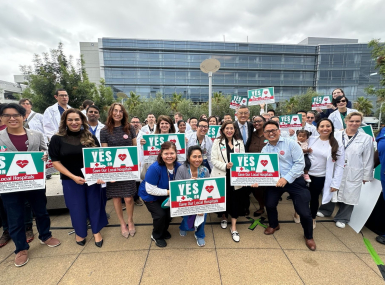Maryland rural health program aims to prevent teen pregnancies, STIs

Key Takeaways
Six rural counties in Maryland are combating disproportionately high rates of sexually transmitted infections and teen pregnancies by increasing comprehensive sexual health education and bringing youth into the conversation.
Allegany, Dorchester, Somerset, Washington, Wicomico and Worcester counties are all receiving funding from a federal grant to overcome barriers rural communities face in sexual healthcare and education, such as higher rates of poverty, lower rates of health insurance and limited health education programs and options for healthcare facilities and transportation.
Learn more
The initiative, dubbed “True You Maryland,” provides the counties with more than $1.4 million annually through a grant from the U.S. Department of Health and Human Services’ Office of Population Affairs (OPA) Teen Pregnancy Prevention program. Its goal is to reduce Maryland rural county teen birth rates by 15 percent, STI rates by 10 percent and racial disparities in teen birth and STI rates by 20 percent.
“The mission of True You Maryland is to promote the very best sex education and sexual health for all youth, no matter who they are or where they live,” said Meghan Rimelspach, Maryland Department of Health’s child and adolescent health program manager. “…All young people should have the same access not only to health information, but also to healthcare, and it should be regardless of race, ethnicity or any other social determinants of health.
“We know that in some communities, STI rates and teen birth rates are higher among some races than others, so a lot of this work is really meant to sort of even the playing field — we want everyone to have the information and the resources they need to keep themselves safe to avoid some of those negative outcomes.”
True You is led by the Maryland-based non-profit Healthy Teen Network, which places an emphasis on equity and addressing sexual and reproductive health through an intersectional and trauma-informed lens.
“It’s not just about teen pregnancy prevention, it’s not just about STI or HIV prevention, we’re trying to flip the script so that people understand the importance of this being just one more health area that you need to be thinking about,” said Deborah Chilcoat, Healthy Teen Network’s senior manager of capacity building and evaluation. “Prioritizing taking that holistic point of view is really important.”
The six counties were chosen by the Maryland Department of Health for the program because they all have higher STI and teen birth rates than the state average and had demonstrated that they wanted to bridge the sexual health gap, according to Rimelspach.
“The communities we’re working in were selected because they were already doing some work around sexual health education, so they had a good foundation that we could build on … and they were interested and ready to dive into the work,” Rimelspach said. “All of them recognized that some of those barriers often associated with rural health were happening in their communities, and they were excited to be part of this opportunity that would help address that.”
The Dorchester County Health Department had previously partnered with other community organizations on safe sex programming and also has school-based health centers in the county’s public schools, according to Angela Mercier, Dorchester County Health Department’s health education manager. Only 28 percent of school-based health centers are located in rural areas and an even smaller percentage provide sexual and reproductive health services.
“The programming wasn’t strictly [about] safer sex, but it was curriculum around reproductive health and healthy relationships that included role playing and educational information, so it addressed the education but also gave the skills to have those difficult conversations and relationships,” Mercier said. “We in the past have mostly worked with faith-based organizations, nonprofits and afterschool programs, and then True You Maryland gave us an opportunity to work more with the schools.
“…We are fortunate to have school-based wellness centers, so there’s health department employees who are staffed within the middle and high schools who can offer things like contraceptive services or clinical services with youth, so we already had that connection within the schools, and it just made sense to expand on what we were doing in offering the comprehensive curriculum and more support services.”
True You is a partnership of the six counties’ health departments and public schools, with universities and organizations at the county and state level, including YMCA and Planned Parenthood Maryland.
“The state supports have been fantastic, just the wealth of information that they’ve pulled together and provided expert level information to help shape some of our workshops and educational presentations and materials,” Mercier said. “I say that they’ve been more of a TA role, but we’ve really looked to our local community partners to kind of guide what we’re doing on the day-to-day.”
Each county involved in True You has created a youth advisory board for teens to provide input on what young people want to know more about regarding sexual health. The 130 youth board members also serve as a mouthpiece for the initiative, sharing among their peers why getting educated on sexual health is important, Rimelspach said. The aim is to engage teens in a way so that they aren’t just getting lectured on sexual education, but are instead a part of the conversation.
“This really helps center youth at the heart of the work,” Rimelspach said. “We want their input, we want to be working alongside them and not handing things down to them and they have so much great insight to share — they are literally the experts in what they need and what they’re interested in.”
Schools in four of the counties have implemented adaptations of the Positive Prevention Plus program, an evidence-based comprehensive sexual health education program, through True You. Research shows that teens who are educated through Positive Prevention Plus report becoming sexually active later, increased use of contraceptives if sexually active and having more communication around sexual health issues with their parents, compared to those not educated through the program.
Schools in Allegany County and Wicomico County chose not to implement the framework. Chilcoat said she attributes the decision to a fear of backlash, referencing the “parents’ rights” movement.
There’s a growing movement of parental rights activists who think caregivers should have a larger say in what’s taught in the classroom — and legislation in some states has followed suit, from bans on critical race theory to books; however, data shows that 93 percent of parents support sex education in schools, the majority of whom want classes to cover puberty, healthy relationships, abstinence, sexually transmitted infections and birth control.
While the two counties don’t teach the Positive Prevention Plus model in their public schools, they both incorporate True You in other capacities. Wicomico County has worked closely with the Parents, Families and Friends to Lesbians and Gays (PFLAG) organization to make sexual education more inclusive and its youth advisory board distributed hundreds of backpacks stuffed with sexual health resources to teens throughout the county, while Allegany County focuses primarily on youth engagement, according to Chilcoat.
“Communities really had to opt in — they needed to want to be a part of this, so in each community that we’re currently in, we had champions, we had people who were excited for this work to come, we had people who valued this information getting to their young people,” Rimelspach said.
“And all of those communities are still interested in continuing the work together, so whatever has happened in the political climate, that has stayed a steady thread throughout that people value this information for young people and want it to happen.
“… Parents and caregivers don’t have to worry about knowing all kinds of technical information about puberty, they can leave that to the health teacher and then they can talk sort of about those values and morals around sex that the young people won’t be getting in the classroom — the classroom’s just for science-based facts.”
True You’s focus is on educating Maryland’s rural youth on sexual health, but another element of it is engaging parents and caregivers by connecting them to sexual health resources and helping them communicate with their teens about healthy relationships.
“We recognize it’s a safer-sex focus, like teen pregnancy and STI prevention, but you have to look at the bigger picture and overall health to really make an impact,” Mercier said.
“So, it’s not just strictly connecting them to contraceptive services, but maybe there are issues in the home with housing or transportation or childcare, so it’s trying to connect the dots to make sure that they have services and support in the community.
“Some of it might be outreach and partnering with our community partners when they hold events, that could be health fairs or fun things like paint nights, and just making sure that the information is there and available.”
True You is on its third and final year of the OPA grant, but Healthy Teen Network is currently applying for new funding for the six counties to continue their work in educating the community on sexual health.
Rimelspach said there are plans in the works to expand beyond schools into clinics and community organizations.
“I sure hope we get funded, because these counties deserve it, they really do,” Chilcoat said. “Not just to drive down statistics, but the youth have spoken — we asked them about what their needs are, and they want better sex education, that was loud and clear.”
Attachments
Related News

CMS issues new guidance on Medicaid Community Engagement Requirements
On December 8, the Centers for Medicare & Medicaid Services (CMS) released a Medicaid and CHIP Services Informational Bulletin (CIB) directing states on how to implement the Medicaid community engagement requirements enacted under Section 71119 of the One Big Beautiful Bill Act legislation (Public Law 119-21), or H.R. 1.

California county sales tax measure backfills federal healthcare cuts
Santa Clara County, Calif. will raise an estimated $330 million each year from a sales tax to backfill lose Medicaid funding.

